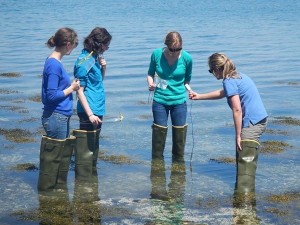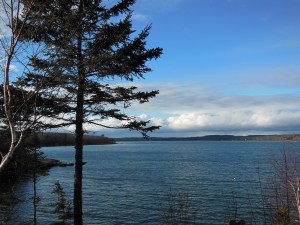 I’m Emma Fox, a former AmeriCorps with MDI Biological Laboratory, now a Master’s Student in Ecology and Environmental Science with the University of Maine School of Economics. You may remember me from my presentation about the New England Sustainability Consortium (NEST) at the Frenchman Bay Partners (FBP) 2015 Annual Meeting at College of the Atlantic.
I’m Emma Fox, a former AmeriCorps with MDI Biological Laboratory, now a Master’s Student in Ecology and Environmental Science with the University of Maine School of Economics. You may remember me from my presentation about the New England Sustainability Consortium (NEST) at the Frenchman Bay Partners (FBP) 2015 Annual Meeting at College of the Atlantic.
A response report for a NEST Maine and New Hampshire coast-wide survey is now available (by request), with information on citizen perceptions of: current water quality, factors that impact water quality and consequences of changing water quality in Maine and New Hampshire. As a Partner, you will receive an invitation later this summer to participate in a similar survey. I’m working on making the coast-wide data even more relevant for FBP work, so I plan to use the survey results to produce an FBP-centered report and provide support for the Partners as we continue to explore market-based solutions to conservation and Ecosystem Service Valuation. The FBP survey and subsequent technical report will be a piece of my Master’s thesis research.
So, how clean is our water?
 When evaluating the outcomes of water quality testing from beach areas, National Resource Defense Council’s (NRDC) “Testing the Waters 2014” ranked Maine #27 out of 30 in terms of water quality, and New Hampshire was ranked #2, only behind Delaware. Maine and New Hampshire’s coastal residents did not necessarily agree with the NRDC rankings, indicating a potential gap between perceptions and water quality testing: 68.8% of respondents said that Maine had very good or excellent coastal water quality, compared to 46.3% of respondents who said NH had very good or excellent coastal water quality.
When evaluating the outcomes of water quality testing from beach areas, National Resource Defense Council’s (NRDC) “Testing the Waters 2014” ranked Maine #27 out of 30 in terms of water quality, and New Hampshire was ranked #2, only behind Delaware. Maine and New Hampshire’s coastal residents did not necessarily agree with the NRDC rankings, indicating a potential gap between perceptions and water quality testing: 68.8% of respondents said that Maine had very good or excellent coastal water quality, compared to 46.3% of respondents who said NH had very good or excellent coastal water quality.
Do citizens think about what impacts our coastal water quality?
71% of residents did not believe there was any change they could make to their behavior that might negatively affect coastal water quality; however, 94% of residents believed that if their neighbors changed their behavior, it could improve coastal water quality.
What are citizen priorities for coastal managers?
Residents had strong opinions about coastal manager priorities: “reducing pollution entering coastal environments” was listed by residents as a top priority for coastal managers, followed by “protection or enhancement of coastal water quality.” When asked to contribute financially towards protecting coastal water quality, 61.3% of residents responded that they would agree to pay higher water/sewer/septic fees to improve coastal water quality.
Thank you for your continued interest in this important work, and thanks in advance for your participation in the upcoming survey!